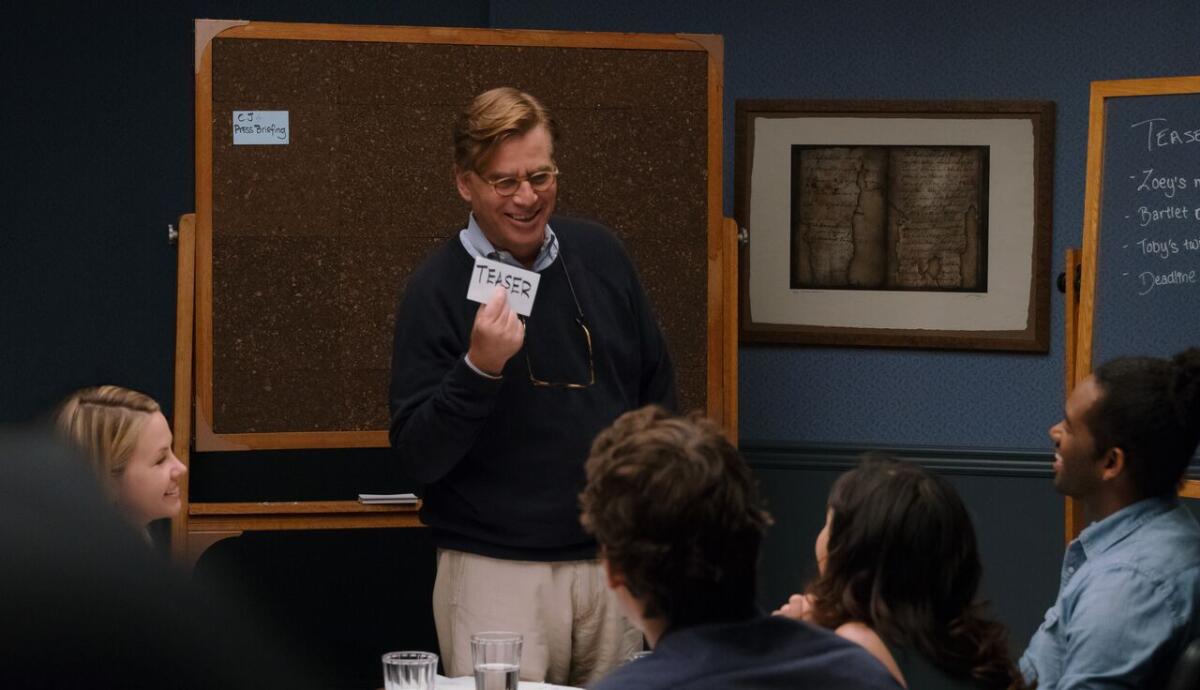Scopely, Kite & Lightning and Masterclass among week’s L.A. tech highlights
- Share via
Scopely, the video game company that has ridden mobile versions of Yahtzee and zombie horror franchise “The Walking Dead” to recent success, announced $55 million in new funding Tuesday.
The financing comes on the back of a sixfold increase in quarterly revenue compared with 18 months ago, Chief Executive Walter Driver said, declining to provide exact figures. His Culver City company has cash from profits, but the big investment means that Scopely can finance more partnerships sooner, he said.
Scopely relies on a network of studios to produce games, and then applies its marketing and operating know-how to attract players and rake in revenue from in-app purchases. The individual firms, which may make just one or two games, generally can’t win over investors as easily as Scopely, which has a wider portfolio.
“We’ll both expand our studio ecosystem and deepen our relationships with studios already in it,” Driver said. “This financing should give us unlimited runway — I don’t think we’ll ever burn through this cash.”
About $25 million of the funds comes from Greycroft Partners. Other investors are Growth Fund, Elephant Partners, Evolution Media Capital, Highland Capital and Sands Capital Ventures. Also putting in money was video game publisher Take-Two Interactive, whose only other venture investment was in streaming app Twitch, Driver said.
Greycroft’s Mark Terbeek and Scopely President and Chief Operating Officer Javier Ferreira are joining the company’s board of directors. Scopely had raised almost $45 million previously.
“The future of entertainment is interactive, real-time experiences and Scopely is so well-positioned at this transition away from passive entertainment,” Terbeek said.
Half a dozen new games could ship by the end of 2017. Developing a mobile game has become an increasingly lengthy process that can now take around 18 months, Driver said.
With players more picky about apps, games must be sophisticated from Day One to draw their attention. That takes extra time. By comparison, “The Walking Dead: Road to Survival,” released last fall, needed a year of work, Driver said.
"We’re trying to create best-in-class experiences out of the gate that can be five-to-10-year businesses," he said.
Scopely already thinks that it has a few of those. "Dice With Buddies," released in 2012, has increased revenue annually. “Walking Dead” has achieved that feat monthly, with $15 million brought in during the first three months. Both “Yahtzee With Buddies” and “Walking Dead” were top-10 revenue producers in the U.S. among new mobile games last year, according to Scopely.
Though based on the comic book version of the popular entertainment franchise, “Walking Dead” still got a lift from the AMC TV series last year. The game continues to do well because hardcore fans want to remain engaged with the story until the show returns in October, Driver said. Those diehard fans were why Scopely had ranked the franchise at the top of its partnership wish list.
One way that Scopely has boosted revenue has been tapping usage data to personalize games for segments of users. Alerts and in-game message appeal differently to highly competitive players than other users.
“Where do people want spend more time, where do they want to spend money, who did they want to play with — those dramatically change” the life span of games, Driver said.
Kite and Lightning

Ikrima Elhassan and his business partner, Cory Strassburger, spent the last three years producing virtual reality projects for Hollywood. Now they want to make giant animated babies fight.
Their two-man Santa Monica start-up, Kite & Lightning, switched directions a year ago. They’d always wanted to make interactive entertainment for virtual reality headsets. But rather than put all their savings into one big project, they collected cash doing basic, marketing-style videos for the likes of NBC, Lionsgate and General Electric.
The seven small virtual reality experiences gave them some good ideas about how camera angles, pacing and other elements should work on the new medium. They've spent the last year applying those lessons to the framework of a giant video game, “Bebylon Battle Royale,” that lets players control virtual babies in Colosseum-staged fights.
After picking up $2.5 million from investors this month, Kite & Lightning is growing to five people and planning to embark on extending “Bebylon” past a prototype.
Investors include Raine Ventures, Courtside Ventures, Comcast Ventures, Social Capital, Greycroft, Boost VC and Outpost Capital. Raine managing partner Gordon Rubenstein called the idea “the most impressive social gaming experience” his firm has ever seen.
The virtual reality game is meant to be a bit outlandish. “Bebylon” is a community of cursed immortals. They never die but they never age. So their lives are all about becoming the most famous baby around. Narcissism and ego are rewarded. In the middle of a battle? Better take a selfie to gain more followers and ego points. More points means access to fancier stores, like ones that sell gold-plated selfie sticks, Elhassan said.
People who want to duel or explore the realm of Bebylon must pay a to-be-determined price upfront. Others can watch matches from their virtual reality headsets without paying for the game. But viewers will be able buy virtual items such as tomatoes to chuck at weak combatants.
Elhassan is targeting a beta release of the game early next year.
MasterClass

San Francisco start-up MasterClass has added an executive and office in West Hollywood to help persuade more celebrities and experts to become instructors on its service.
MasterClass offers $90 enrollment in online classes taught by superstars of their field, including acting from Dustin Hoffman and tennis from Serena Williams. About 30,000 people signed up in the first few months after a launch last year, but the start-up hasn’t disclosed usage since August.
The expansion, after a $15-million fund raise this year, suggests that many aspiring actors, writers, singers and athletes want in.
Television producer and tech investor Matthew Rutler, now senior vice president of talent and business development, is beginning his new gig with about 120 people he’d like turn into teachers.
The company started with arts and sports because that’s where founders David Rogier and Aaron Rasmussen saw opportunity. But they said the plan is to add subjects quickly, including business.
“My dream business class would be from Warren Buffett or Elon Musk,” Rasmussen said. “Our goal is to teach classes with the best people in the world, so we don’t know what that means for the overall roster yet but we’re excited to find out.”
Rutler, who has invested in MasterClass, Lyft, Pinterest and several others, said being in Los Angeles would make his job simpler because it’s “the center of the world’s best talent.”
Rogier said stars who’ve turned down MasterClass mostly blame busy schedules that would prevent them from filming and editing instructional videos for a couple of weeks or making the ongoing commitment to evaluate student work and answer their questions.
Students go at their own pace, though there’s no guarantee that the teachers will be tuned in to submissions indefinitely. But MasterClass is betting that it’s picking people whose advice will remain a worthwhile purchase for a century at least, Rogier said. A screenwriting class from “West Wing” creator Aaron Sorkin launches Tuesday.
MasterClass attempts to give classes a Hollywood look by bringing in top-shelf equipment and big-name directors — it’s “not just a camera in the back of the classroom,” Rogier said.
The firm also values interactivity, with plans to create more tools like an online vocal range finger in Christina Aguilera’s singing class. The software then personalizes a warm-up track for the student. MasterClass wants to get more offline interactions between students happening too through movie screenings and other events tied to the material.
Elsewhere on the Web
Online video company Machinima has partnered with Chinese online media giant Sohu to get its productions in front of Internet users in China, according to Variety.
News magnate Rupert Murdoch’s daughter Elisabeth has a launched a new media company, Vertical Networks, that’s partially owned by Snapchat and for now exclusively publishes on the popular app under the brand Brother, according to Recode.
Santa Monica job hunting start-up ZipRecruiter expects $140 million in revenue this year, up from $100 million last year, according to USA Today.
Santa Monica start-up Lunaya is selling luxury sleepwear as it tries to extend the popularity of athletic leisure clothing to new areas, according to Forbes.
Rover, the chief rival to dog-sitter-and-walker online marketplace Dog Vacay, hired a chief financial officer who has worked at a public company, according to Bloomberg.
Film studio Warner Bros. could come out with the movie, “Worst Tinder Date Ever,” about a Los Angeles couple who fall in love despite a terrible night out, according to the Hollywood Reporter.
In case you missed it
Dollar Shave Club, one of the darlings of the Los Angeles’ start-up scene, is cashing in on a $1-billion payday — a rise fueled by a disruptive business model and a series of offbeat viral ads.
Champagne, tacos and time off: How Dollar Shave Club employees are celebrating the $1-billion sale.
Dollar Shave Club proved the value of irreverent marketing when Unilever announced that it would acquire the Venice start-up for $1 billion.
A West Hollywood woman sued Uber Technologies, alleging that the ride-hailing company’s negligence led to her being raped by an Uber driver who was convicted in the incident.
The chief executive of meal replacement beverage start-up Soylent has shaken up Montecito Heights with his shipping-container home.
Hyperloop Technologies Inc. is seeking at least $250 million in damages from four former high-ranking employees who the company says tried to incite rebellion within the Los Angeles start-up.
Canopy San Diego is accepting applications for its mentorship program for pot-themed technology start-ups, a first for Southern California, according to the San Diego Union-Tribune.
Coming up
ELeague, the new, 10-week televised tournament for the video game “Counter-Strike: Global Offensive,” comes to an end this weekend. It’s down to four teams vying to make it to Saturday’s finals in Atlanta, which will be aired on TBS. Talent agency WME | IMG is the co-organizer. Though the spectacle hasn’t produced blockbuster ratings, TBS is committing to more e-sports, announcing recently that it would air a championship game for “Overwatch” on Sept. 30.
Tech and media executives whose work spans across Los Angeles and China gather at the Pasadena Convention Center Tuesday and Wednesday for the Silicon Dragon conference, hosted by a media outlet of the same name.
Twitter: @peard33




